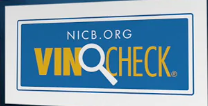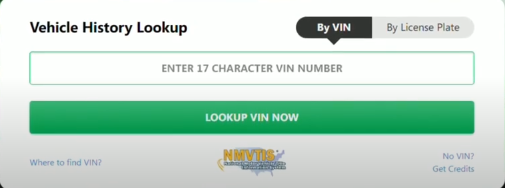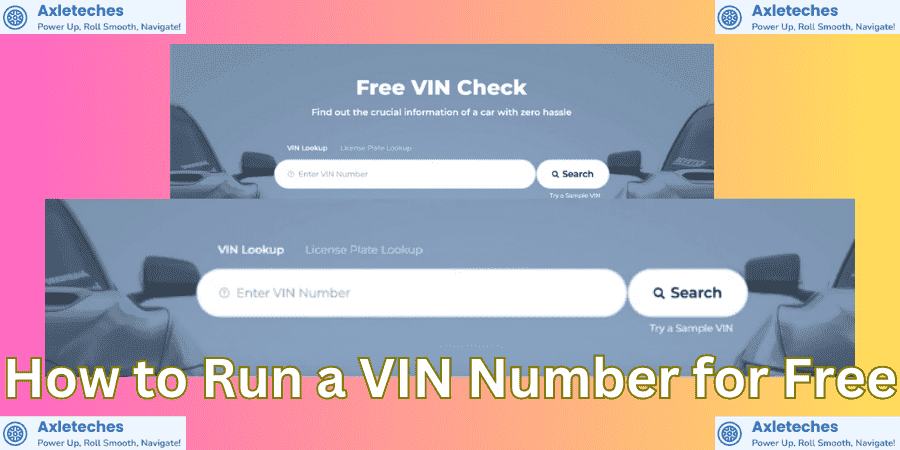The decision to buy a used car can be one fraught with problems. It might be the car of your dreams that has beautiful clear-cut lines external, and yet they cannot tell it is that beautiful from the inside. Well, that is where carrying out a Vehicle Identification Number (VIN) check is useful. It is as if one gets the car’s overall history and makes sure that, despite any outward appearance, it is worth investing in. But do you realize that it is possible to do it without paying a cent? Now that we know the upsides and downs of running a VIN let us explore how to execute the VIN search for free and why it is a pivotal step while acquiring a car.
What is a VIN Number?

A VIN is a combination of 17 characters and each vehicle has a unique number assigned to it. You can think of it as the make and model’s fingerprint: there are no two of them that are identical. This number contains a lot of information as to the make, model, year of manufacture, and country of origin of the car.
Why Running a VIN Number is Crucial
Running a VIN is crucial to verify a vehicle’s history, check for recalls, uncover hidden issues, and confirm ownership details, ensuring a safe and informed purchase.
What You Can Learn from a VIN Number
During the VIN check, several critical facts about the automobile can be known. Here’s what you can typically learn:
Vehicle History
- Accident Reports: This is particularly important for ascertaining the safety and possibility of other problems in a car and; one can learn whether a car has been through an accident or not.
- Ownership History: Hear how often it has been driven by the previous owners and how they used the car—private, fleet, or rental.
- Recalls and Defects: Check if the vehicle you are planning to take has any recall or if there are some defects known to the company that need fixing.
How to utilize NICB for a Free VIN Check

Running a VIN check on the NICB website is straightforward:
- Click on the following link to be directed to the NICB website.
- Enter the VIN.
- Review the report: You’ll see whether the vehicle has been stolen or has a salvage title.
Running a VIN Check on VehicleHistory.com
VehicleHistory.com is another excellent resource. Here’s how to use it:
- Visit VehicleHistory.com.
- Enter the VIN in the search box.
- Get your report: The site will provide accident history, recalls, and more.
Using iSeeCars VIN Report
iSeeCars is known for its detailed free reports. Here’s how to access them:
- Go to iSeeCars.com.
- Enter the VIN.
- Review your report: You’ll get pricing trends, accident history, and more information.
Interpreting the Results of a Free VIN Check

Once you have your report, it’s essential to know how to read it:
What does it mean to be literate in the key terms and the data?
Accident History: Analyze if there have been any reported accidents and one has to think about their level.
Title Information: Look for titles indicating that the car had some issues that may deem it unsalvageable or brands that suggest the same.
Why the free VIN checks have some disadvantages
While free VIN checks are helpful, they have their limits:
- As the speculation of the study, the possible missing information is as follows:
- You may receive less or no lien information, the full history of the owners, or complete title history records.
- The solution to a poem’s gaps is to read on, and fill it in; While there, fill it in.
- Think about heading back to the seller with a paid VIN check or using several free options to create a more comprehensive report.
When to Go for a Paid VIN Check
At times, even a free VIN check is not sufficient. Here’s when you might need to go for a paid version:
Situations Which Requires the Use of Paid Check
This is especially true where the vehicle’s history is a bit chequered, or you are procuring the car from a private seller with little traceability.
Benefits of Detailed Reports
Paid reports contain detailed information such as lien checks, full owners’ history, and title history that helps to provide you with confidence.
Benefits of Running a Free VIN Check
- Accident History: Discover if the car has been in any accidents.
- Ownership Records: See the number of previous owners.
- Title Information: Check for any title issues like salvage or rebuilt titles.
- Theft Records: Ensure the car hasn’t been reported stolen.
What Famous Personalities Say About VIN Checks
Jay Leno, a renowned car enthusiast and host of “Jay Leno’s Garage,” emphasizes the importance of VIN checks: “Before buying any used car, a VIN check is a must. It’s like a background check for your vehicle. You don’t want any surprises down the road.”
Elon Musk, CEO of Tesla, also highlights the significance: “Transparency in vehicle history is crucial. A free VIN check can save you from potential headaches and ensure you’re making a well-informed decision.”
Jeremy Clarkson, former host of “Top Gear,” adds a touch of humor: “Think of a VIN check as a first date. You want to know everything about the car before you commit. It’s better to find out now than regret it later.”
Running a VIN check is a simple yet powerful tool to ensure you’re making a safe and informed purchase. By following these steps and heeding the advice of automotive experts, you can confidently navigate the used car market.
Conclusion
Offering a free VIN run is an inventive, basic gesture in the procurement of a car. Is like hiring a personal detective who will discover obscure facts about vehicle history and assist during decision-making. In both cases, the VIN check will serve as your armor against the camouflage of defects and cons that some dealers or private sellers may pull over you. Do not miss this step – it is always worth it to have a clear mind.
FAQs
How often should I run a VIN check?
It’s a good idea to run a VIN check each time you consider purchasing a used vehicle, even if you’ve done so in the past.
Can I run a VIN check on any vehicle?
Yes, as long as you have the 17-character VIN, you can run a check on any vehicle.
Is a free VIN check enough to buy a used car?
It depends on the vehicle’s history. For peace of mind, consider using both free and paid VIN checks.
How do I find the VIN on a vehicle?
The VIN is typically located on the dashboard near the windshield, inside the driver’s side door, or on the vehicle’s title and registration documents.
What should I do if I find discrepancies in the VIN report?
If you notice any discrepancies, ask the seller for clarification or leave if things don’t add up.

